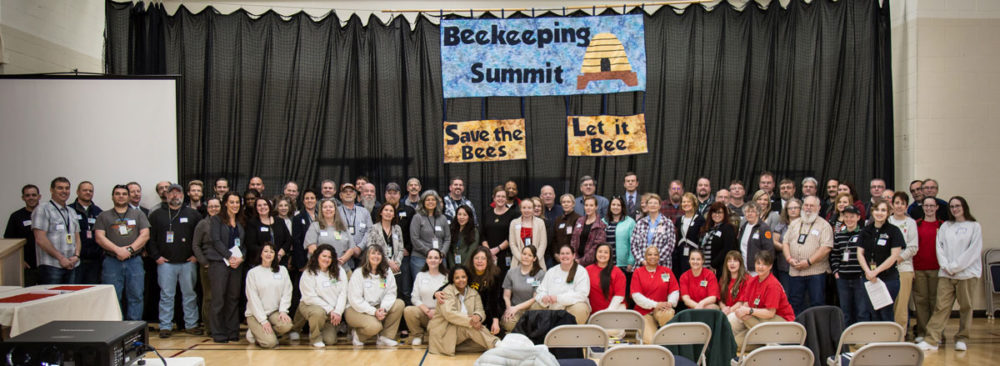by Joslyn Rose Trivett, SPP Education and Outreach Manager, and Susan Goldwitz, Beekeeper and Program Coordinator

Two-and-a-half years ago, beekeeper Susan Goldwitz traveled from Massachusetts to Washington State and attended the first-ever beekeeping summit in a prison. More than a few beekeeping programs were born that day. Delightfully, Susan Goldwitz took some of that inspiration beyond Washington!

For three years previous, Susan had been trying to create bee program in Massachusetts prisons and jails. She had been teaching literature and other classes in prison for nearly six years, but hadn’t yet found traction on adding beekeeping. After the summit, she returned home reenergized and with an improved, inspired pitch. She made her proposal more than a dozen times, to any facility willing to hear it.
As the “no”s and “maybe”s stacked up, she kept in touch with SPP. Susan is unusually good at asking for and receiving help — a strategy I admire — and I was happy to provide the advice and encouragement she requested. She also had the support of another ardent beekeeper, former Governor Deval Patrick; he encouraged her to “Keep pushing!” So she kept pushing. She knew how to take our optimism and translate it into programming success.
On her 12th or 13th try, at last, she found a willing host: Norfolk County Sheriff’s Office in Dedham, MA. They were willing to take a risk on this unusual program, to think outside of the normal menu of activities and educational programs for the incarcerated. The jail had an abundance of outdoor, open space and — bonus! — a member of the staff was already an enthusiastic beekeeper.
This summer, I received a welcome update, which you may read below. It is so pleasing to share Susan’s story of success!

“It’s been far too long since we connected and I’m taking this opportunity to send you a little note to let you know that persistence can pay off!
I was able to start a pilot beekeeping program at a jail in Dedham two years ago. It took the usual meetings and waiting, but finally (after three years of trying!) I found a jail willing to take a chance on this “out of the box” program.
I set up two little hives at the jail, paid for everything myself, and worked with a wonderful company here called Best Bees because they have an overarching insurance policy — helpful for assuaging the security concerns of the administration.
We had a great year; the bees might have known there was a great deal on their little shoulders. We had two thriving hives, a honey harvest, and only two little stings: one on an officer and one on a prisoner. That turned out to be a little blessing in a painful disguise: the men recovered, no one was in danger, and some institutional fears were allayed.
Both hives overwintered successfully (!) and the jail decided to take on the program themselves — to pay for and support it. Now I’m focused on getting a beekeeping school together to start (I hope) this winter. Small steps, as ever.
I’ve just set up a meeting with the Suffolk County House of Correction (Boston) to discuss starting a similar program there. Fingers crossed! I think I needed a sufficient track record at one facility before attempting to convince another.
I did talk to the head of a wonderful program here called the Urban Farming Institute about having a place for newly released prisoners to practice their beekeeping. We have just opened our discussion, but the President/CEO Patricia Spence was enthusiastic about the eventual opportunity and hopes they will be setting up hives at one of their gardens soon.
I wrote once more to our mutual friend, Governor Patrick, to let him know of the jail successes, and yet again he was encouraging and supportive.
That’s the brief news from here. Hope you are well and that you and your programs are thriving.
Let me thank you and SPP once again for your unflagging support, expertise, and gentle cheerleading. It definitely made all the difference!”
Re-reading Susan’s news now, it’s no surprise me that she’s found success. Building programs in prison is really challenging. The best way to meet those challenges is large quantities of persistence, creativity, and positivity. Susan clearly has all three!
End Note
Susan’s other great love is poetry, especially Emily Dickinson’s. The poet wrote about 100 poems concerning bees in her collection of about 1789 poems. Here are a few delicious examples:
Identifying numbers are from Thomas H. Johnson, ed. The Complete Poems of Emily Dickinson.

#1627
Version II
The Pedigree of Honey
Does not concern the Bee –
A Clover, any time, to him,
Is Aristocracy –
#1755
To make a prairie it takes a clover and one bee,
One clover, and a bee,
And revery.
The revery alone will do,
If bees are few.
#676
Least bee that brew –
A Honey’s Weight
The Summer multiply –
Content her smallest fraction help
The Amber Quantity –
#1220
Of Nature I shall have enough
When I have enter these
Entitled to a Bumble bee’s
Familiarities.